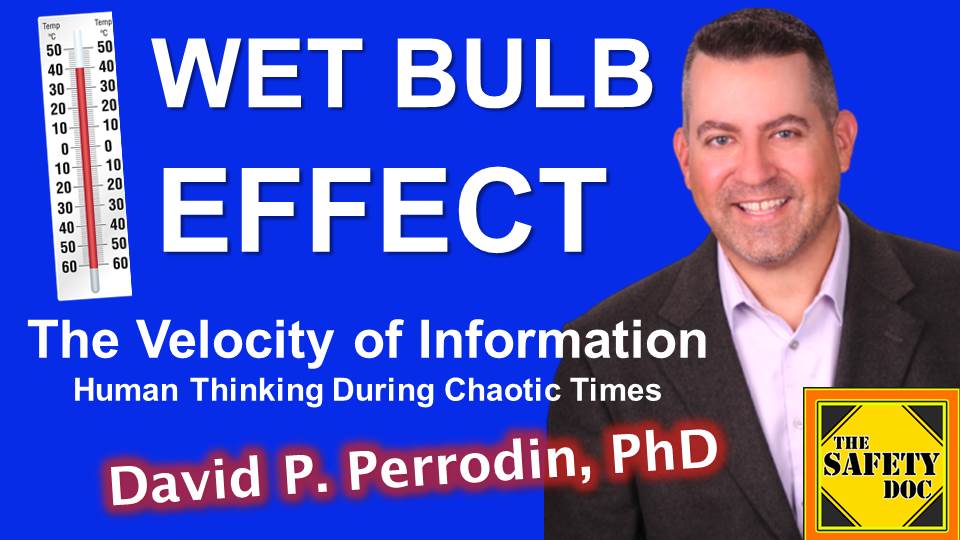Measuring the Wet Bulb Effect on Attention and Information | The Velocity of Information | SDP177
[Podcast] Stagnant, sweltering summer days cocoon us with unshakable pulsing heat and sticky humidity in what is known as a wet bulb effect. It’s downright uncomfortable. Our attention deviates from things at hand and centers on making an escape to our air-conditioned cars and dwellings, but the reprieve is temporary – and some of us lack the luxury of climate control other than sitting beneath the canopy of trees and sipping on a cold drink. But, it’s that combination of heat and humidity which agitates us, saps our energy, stifles our motivation, and can even knock us out with heatstroke. It’s uncomfortable just thinking about it – and that’s what most people have been doing the past two years, sweltering in their minds – bad news is the heat and unrelenting information is the humidity. In today’s show, Doc explains the wet bulb effect as it relates to information and human attention. We’ll learn how human attention works and ways to mitigate information overload during uncertain times. Doc will read an excerpt about Wet Bulbs from pages 74-75 of his book, ‘The Velocity of Information: Human Thinking During Chaotic Times.’

DIRECT LINK to MP3 of this Episode: https://tinyurl.com/SDP177-AUDIO
WHAT IS A WET BULB? “A wet bulb temperature is taken when you wrap an ambient-temperature thermometer bulb in a wet muslin fabric, exposing it to air flow to promote evaporation, and then measure the difference in temperature. When the air is hot and humid, evaporation is stifled and the wet bulb and dry bulb measurements will be close—too close for comfort. We are saturated, swimming in sweat, and overheating.”
COMPETITIVE CYCLISTS, WET BULBS, AND MAKING CRITICAL DECISIONS. Competitive cyclists, like former Soviet National team member Nikolai Razouvaev, rely on the wet bulb measurement to inform their decision to take the bicycle out on a hot and humid day. What can be done to cool down? Perhaps lighter clothing, extra water, frequent breaks, easier terrain, or postponing the outing for a time with a lower wet bulb reading. But what if you do not have an option? What if you must race?”
EXAMPLE OF PSYCHOLOGICAL WET BULB EFFECT. “Your phone buzzes. It is a push alert from the newspaper you trust, about the governor’s upcoming press conference on COVID-19. Another alert comes in an hour later: case and death numbers and summary guidance from the press conference.The phone buzzes a third time. It is an emergency alert ordered by the governor; if you had somehow missed his comments earlier. On your way home, a dynamic messaging sign on the freeway encourages you to “mask up.” Your televised football game is interrupted by misty-eyed celebrities urging that “we’re all in this together.” The 11 o’clock news will offer the very latest.” “[In] a global pandemic, at the height of the Information Age, we are all wet bulbs, spinning away. We are not just wet, we are soaked.
OPTING IN FOR INFORMATION. And we chose this situation for ourselves.” “[W]e opt in to news push alerts. And we could opt out of emergency alerts, if we so chose. But in both cases, we have decided that the risk of saturation is tolerable compared to the alternative, fear of missing out. The velocity of information is too great to remove ourselves from the equation.
MITIGATING THE WET BULB EFFECT. Begin by acknowledging your behaviors. Short-tempered, frustrated, overwhelmed, unable to attend to tasks. These are reactions to stimuli. Change the channel, or better yet, turn off the receiver. The information is still hammering down on you, but if you’ve turned off your receiver (or tuned the squelch), your attention shifts to the hike or the golf game (Aaron Clarey?) and you seemingly be the last person around who hasn’t heard the “latest hyped news” which, actually, likely won’t have a significant impact on your life. And, what are you going to do about it? During uncertain times when media and people feverishly pass headlines, take a pass. You can sample from time to time and get the information that you need. No use in hovering at the buffet table waiting for another pan of wings to be dumped into the trough.
OPT IN TO BECOME FORCE IN? Putting a toe in the metaverse, real-time digital tracking of our phones and cars, and Elon Musk’s hints of neural links are all easements (or encroachments?) into a life where opting out will require effort and consequences. How are you preparing for the omnipresent wet bulb?
FOLLOW
- Watch this episode on “The Safety Doc” YouTube channel https://tinyurl.com/SDP177-VIDEO
- Listen to this episode on PodBean MP3 https://tinyurl.com/SDP177-AUDIO
- Apple Podcasts http://tinyurl.com/SafetyDocApplePodcasts
- SAFETY DOC WEBSITE & BLOG safetyphd.com
- Follow David & The Safety Doc Podcast on Twitter @SafetyPhD
- Email Dr. Perrodin [email protected]
Purchase Dr. Perrodin’s books
School of Errors – Rethinking School Safety in America
The Velocity of Information – Human Thinking During Chaotic Times
